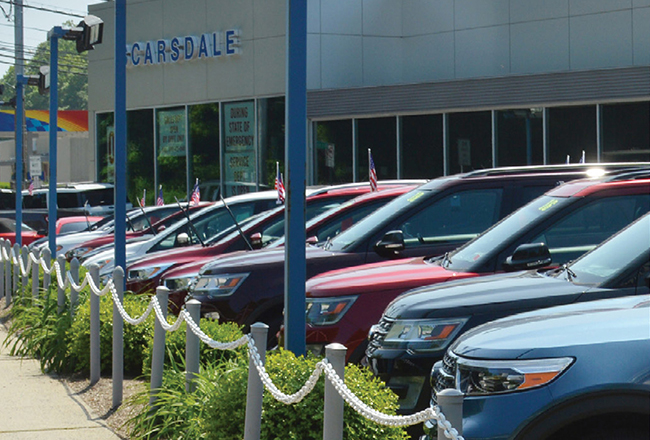Automobiles, whether bought or leased, are big-ticket items for consumers. They also represent major sources of tax revenue for governments in addition to having employment and economic-activity impacts on communities.
In the New York metropolitan region, the auto dealerships have taken an estimated 81% financial hit from the restrictions enacted to combat the spread of COVID-19.
While other areas of the state were starting to reopen businesses and the Mid-Hudson, Long Island and New York City Regions remained closed, state restrictions on auto dealers were eased slightly.

The dealers previously were being allowed to sell vehicles remotely and after mid-May were given permission to have customers make appointments to visit showrooms in order to shop for new vehicles and take test drives. Walk-ins still were not permitted. From the beginning, dealers’ service facilities had been deemed essential and were allowed to continue operating.
When Gov. Andrew Cuomo put together the list of essential businesses, repairing cars, selling parts and doing body work for consumers and first responders was permitted. “But not the sales division. That was completely closed down,” Mark Schienberg, president of the Greater New York Automobile Dealers Association told the Business Journal. “When it did open up, we surveyed our members a couple of weeks after when they were allowed to sell remotely, and dealers’ businesses were off on average about 81 percent.”
Schienberg said, “The service was off 65%, 70% too, just because people were concerned about leaving their homes. We had these business operations that employ an enormous amount of people throughout the downstate area really only conducting a fraction of the business they would normally do and the concern, of course, was how long could they sustain that big of a cut.”

The association represents more than 400 franchised new car dealers downstate, including Westchester, Long Island, New York City and other areas. According to its 2019 report based on 2018 data, the segment is the fifth-largest employer in the Metro New York area, provides more than 71,000 jobs with payrolls totaling $4.5 billion, generates tax revenues of $2.5 billion and has an overall economic impact of more than $51 billion. There were 6,014 employees at dealerships in Westchester.
New vehicle retail sales in the metro region totaled 602,000 units valued at $38.5 billion. Statewide, dealers had sold 955,500 new vehicles worth $59.2 billion.
“According to some of the surveys we were doing of some of our dealers, asking them generally what’s going on, they were saying if it doesn’t turn around within three months they were going to have to close their stores,” Schienberg said.
“Some of them might have been able to weather the storm somewhat, but these are big operations with big properties, big property taxes, mortgages that they might have on the property, utility costs. It’s a big operation and to keep it going for too long would be almost impossible.”
Schienberg saw some similarity in what was unfolding to the impact that dealers faced from the 2008-09 financial disruption.
“When the economy dropped off so badly, we lost about 15% of our dealers because of the enormous decrease in vehicle sales at that time. So, this is the same thing,” Schienberg said. “The manufacturers have been somewhat assisting on floor plan coverage. Dealers buy cars from manufacturers and they have to go out to the financial world and get a loan to finance those vehicles while they’re sitting on a lot waiting for a customer to buy them. That assistance was only for two or three months and then the dealer would be responsible for paying the full amount that they owed on it so, of course, that helps in the short period of time. The question is if this continues on for a longer period will the manufacturers continue to help out their franchisees and we just don’t know that yet.”
Schienberg said the pandemic might result in dealers placing more emphasis on the use of remote selling tools in the future.
“Dealers have been able to sell cars remotely for years. I think there’s a sense to adopt more of those consumer-friendly approaches so that way a customer can be able to take a look at vehicle inventory, can pick a vehicle and take a look at financing and really kind of build a transaction a lot farther along than they have been able to in the past,”’ Schienberg said.
“Some dealers have been very successful over the years in making that technology available to consumers. This has just awoken everybody to the fact that consumers really do need to be able to be in control of the vehicle purchase and to be able to have the tools to do it with a dealer. When they get to the point that they know the car they want, they understand the financing, then they come in to the dealer and do a test drive, talk to the dealer about other issues like extended warranties or accessories that they may want and then be able to take the delivery at the end of all this.”
Schienberg said that, during the crisis, the dealers association has been supplying its members with information and guidance on handling a host of issues that were new to the world of cars and trucks.
“Protocols on keeping the dealership clean, following the CDC requirements on it, how did they apply for the small business loan, the PPP grants that are there,” Schienberg said. “We’re doing webinar after webinar on this to help them through it. When they were downsizing, letting people go is a tough issue to do, but they needed to follow all the requirements on that. We worked with the governor’s office on a daily basis to set up the protocols that dealers needed to use.”
Schienberg predicted that as the crisis subsides dealers are going to see a huge pent-up demand for new cars.
“We’re seeing a new kind of buyer that’s coming in, more the 18- to 34-year-olds. They’ve always shown an interest in cars and have come to our auto shows in big numbers, but now are taking a look at new technology vehicles, electric vehicles,” Schienberg said. “Reliable transportation is going to be more important than ever.”
The association owns and operates the New York International Auto Show, which had been scheduled to open April 10 at the Jacob K. Javits Convention Center in Manhattan. Because the Javits Center was set up as an auxiliary hospital to the deal with the virus and large public events remain restricted as part of the ongoing plan to hold down the virus spread, on May 22 it was announced that this year’s show had been canceled. At the same time it was announced that the next show would be held April 2-11, 2021. Schienberg noted that the show first took place in November 1900.
“The auto show is the granddaddy of all auto shows. We get a million people that come in to the show every year at the Jacob Javits Center,” Schienberg said. “As soon as the people feel comfortable and know that they’re coming in to a safe environment I expect the show to be back as strong as it ever was.”
"auto" - Google News
May 30, 2020 at 07:08PM
https://ift.tt/2U9GrZd
New York metro auto dealers shift gears in new economy - Westfair Online
"auto" - Google News
https://ift.tt/2Xb9Q5a
https://ift.tt/2SvsFPt
Bagikan Berita Ini















0 Response to "New York metro auto dealers shift gears in new economy - Westfair Online"
Post a Comment